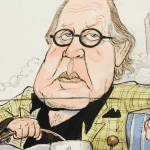NEW champion prevails in a Grand Prix with a lot of extra risk, writes PETER COSTER:
THE Formula One bubble came close to popping at the second race of the season in Saudi Arabia as clouds of smoke drifted towards the track.
Drivers in the second practice session could smell the oily smoke as well as see it. Max Verstappen in the Red Bull said on team radio, “I can smell burning. Is it my car?”
No, it wasn’t but of perhaps greater concern was that the fire about 20 kilometres across the desert was from a rocket attack on the giant Aramco petroleum facility near Jeddah in the oil rich kingdom.
Houthi rebels in Yemen launched the attack as part of a seven-year war with Saudi Arabia in which tens of thousands of people have reportedly died.
The possibility of attacks on the Grand Prix itself had to be considered. There were links to the race that could not be ignored.
Embed from Getty ImagesNot everyone in the F1 bubble that travels the world in private jets while staying in five-star hotels is aware of what is happening in the real world and the countries they race in.
Seven-times world champion Lewis Hamilton was probably the best informed. The Mercedes driver led the Black Lives Matter protest by F1 following black deaths in clashes with police in the United States.
In Saudi Arabia he was deeply concerned at the mass execution of 81 prisoners said to be “terrorists” and “deviants” by the government of Saudi Crown Prince Mohammed bin Salman .
MBS is also the newly elected president of the FIA.
The Aramco petroleum storage plant set ablaze by the rebels is a naming-rights sponsor of the Saudi Arabian GP.
And to make the point, as it were, flags flying at the track depicted a sword, an Arabian scimitar. that should have been dribbling with blood as news filtered out of the mass execution earlier this month.
Those executed in the space of a day were beheaded.
There are also other bloody events associated with the Crown Prince, who will become king on the death of his ageing father.
One such event involved Jamal Ahmad Khashoggi, a Saudi Arabian journalist and a columnist for the Washington Post.
The dissident journalist was assassinated when lured to the Saudi consulate in Istanbul in 2018 to pick up papers for his forthcoming wedding.
He fled Saudi Arabia the year before in fear of his life and was abducted and his body dismembered by a group of 15 assassins supposedly under the direction of the Crown Prince.
Back to the F1 bubble at the Saudi Grand Prix as what seemed to be a news blackout descended on the race.
There was a drivers’ meeting, as reported by Sky News, but little else. The following morning, it appeared there had been a decision not to go ahead with the race.
But then came a meriting some hours later when drivers met with team principals.
The drivers who were concerned with the potential risk to themselves might then have been reminded of their contractural obligations and the risk to their multi-million salaries.
In any case, said at least one team principal, Saudi authorities had assured them there was “no risk” and they had relayed this “reassurance” to the drivers.
There were no details. Perhaps the drivers were to think the Saudi army was hiding behind the nearest sand dune?
It later transpired the Houtis had declared a three-day truce while it was also reported that there were air strikes on Houthi strongholds in which eight people had been killed.
There were further examples of Saudi interference, this time in the direct TV coverage of the lead-up to the race when Haas driver Mick Schumacher was involved in a terrifying crash.
The son of seven-times world champion Michael Schumacher was left unmoving in the car after it hit the wall on the high-speed street circuit.
Replays did not emerge until more than half an hour later.
The only vision was from a camera at the end of the straight as attempts were made to free the driver.
Schumacher was eventually taken away by ambulance and it was reported he had spoken to his mother by phone where she lives with his father on the shores of Lake Geneva.
Jean Todt, Mohammed bin Salman’s predecessor as president of the FIA, visits the German champion regularly and says he watches F1 races on television although he has trouble communicating following a skiing accident with his son that left him in a coma.
Replays of Mick Schumacher’s crash eventually showed what happened as his Haas was launched cross the track after riding up on the concrete kerbing.
The car fell in half when it was being raised by a mobile crane, narrowly missing track marshals trying to remove the wreck.
Lewis Hamilton said he was “uncomfortable” racing in Saudi Arabia after its mass executions this month and has called on F1 to “educate itself.”
The GP itself was a race to the finish with Red Bull’s Max Verstappen and Ferrari’s Charles Leclerc swapping the lead in the final laps before the new world champion crossed the line half a second from the Monegasque driver.
Leclerc demonstrated the respect they have shown each other from their years as rivals in go-karts, giving Verstappen a thumbs-up on the cool-down lap.
Daniel Ricciardo’s sessions went from bad to worse after a fuel delivery failure ended his race in the final laps in Bahrain and his McLaren suffered an engine failure on the 37th of 50 laps in Saudi Arabia.
Ferrari’s Carlos Sainz was third after the Ferraris finished one-two in Bahrain and Saudi pole sitter Sergio Perez was fourth in the Red Bull.
It was another disappointment for Perez, who failed to finish at Bahrain after the same fuel problem that sidelined the Australian driver.
Perez was leading when he came in for an early pitstop in Saudi Arabia only to find himself rejoining in fourth place after being caught behind a safety car.
“Just bad luck, bad timing,” said Perez. “I felt I had the race pretty much under contol and then came the incident from Latifi and basically it hurt me.”
The Williams driver crashed into the wall at Bahrain before the Saudi crash and even those with short memories will remember a similar incident at Abu Dhabi in the last race of the season last year.
The safety car came out and Verstappen rushed to change tyres while Hamilton stayed out only to see the Red Bull driver pass him on fresh rubber.
It requires a rethink on cars getting a free pit stop under the safety car.
Australian race fans will be hoping for a better race from Daniel Ricciardo at Albert Park on April 10.
PETER COSTER is a former editor and foreign correspondent who has covered a range of international sports, including world championship fights and the Olympic Games.




Discussion about this post